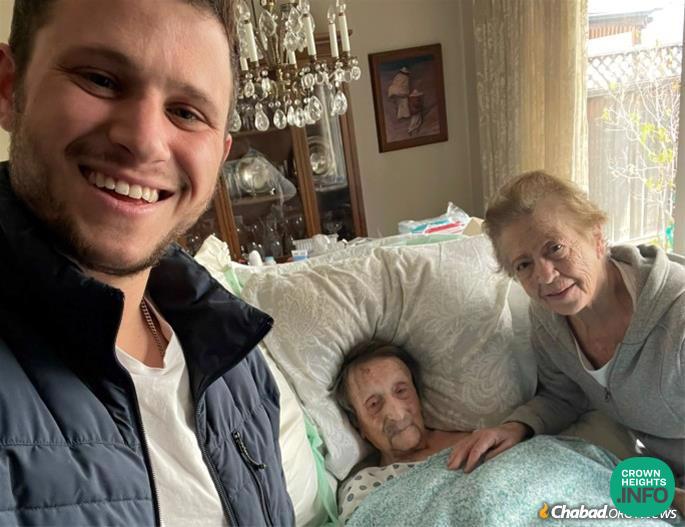
WhatsApp Mobilizes 100 in San Jose After Rosh Hashanah Resolution
by Faygie Levy Holt – chabad.org
It was a few weeks before last Rosh Hashanah, and Roi Bardenstein, a native of Jerusalem, wanted to help others in his adopted hometown, San Jose, Calif. He reached out to a local Chabad rabbi and asked for a list of people in need.
No such list existed, but Rabbi Shaya Bernstein, co-director with his wife, Brochy, of the Chabad Student Center in San Jose, began calling other rabbis in the area to see if there were people who could use a helping hand while Bardenstein reached out to his friends—other young Israelis like himself—to see if any of them wanted to do a mitzvah.
In the year since then, more than 100 volunteers have joined the “Helping Hands” WhatsApp group to buy groceries for families in need, visit with seniors in the community, help people with mobility issues to organize items in their homes and more.
One of those who have received aid from the group is Yekutiel Weinstein, a single father of two young-adults with autism.
He recalls that when he first heard about the program, “I was happy, amazed and so bewildered that they really wanted to help; you don’t get that these days. It’s not just the food they bring, but that they take pleasure in doing the mitzvah. It makes me feel cared for.”
Weinstein went on to say that he’s received deliveries of food before from other places, but the generosity of Helping Hands volunteers was “astonishing.” The first time the volunteers came they brought six bags of food, as opposed to the two bags that he would otherwise receive.
“I was like, wow, that’s a lot,’ and then I opened the bags and there was Angus beef for stew, salmon steaks, hamburgers. It was like Chanukah for a kid. I was just unpacking the bags and saying, ‘Oh my gosh, oh my gosh,’ and I cried and cried. I could not believe it.”

‘It’s a Full-Package Mitzvah’
According to Bernstein, who supervises the program, every aspect of the mitzvah is handled by the volunteers, some of whom may travel up to an hour away to do kindness for others.
“People are surprised to find out that the volunteers pay for everything themselves,” the rabbi says. “I source who needs what and then we find a volunteer who can do it. For something like groceries, a volunteer will shop for the items and may spend $100 to $150 of their own money, and then deliver it to the recipient.
“It’s a full-package mitzvah,” continues Bernstein. “The volunteers feel like they own the mitzvah, and will often go above and beyond. For instance, they may include a challah or a bottle of wine or even flowers if they are delivering the groceries before Shabbat.”

Having the program under the auspices of Chabad is part of its success, says Bardenstein. “Rabbi Bernstein puts in so much time and dedication into getting the names of people who need help, and he gets them to trust that we have no hidden agenda. We just want to help.”
One of those who volunteer for the program is Vital Mor. She’s delivered flowers to seniors in the community and recalls that in one case, “the couple let me into their living room, and we sat talking for over an hour.”
“I had so much fun, and it reminded me of the things I used to do in Israel before I moved here,” she says, adding that “helping Jews in this community makes me feel closest to my home in Israel.”
Bardenstein agrees. “There’s a unity of the Jewish people you feel in Israel. If you see someone who is having a hard time on the street, you help them. If there is someone who is hungry, you buy them a sandwich. Especially at this time—when people in Israel and the Jewish community are torn up—ahavat chinam, ‘uncaused love,’ is the best answer.
“And that,” he says, “we can do.”














anonymous
I was wondering about the hechsher used for the “Angus beef for stew, salmon steaks, hamburgers” and other products given out?
Of course there is no need need for the meat to be Lubavitch shchita, just a reliable hechsher.
And the products distributed should have a reliable hechsher, plus bishul yisroel, and shouldn’t be OU-D.
Even though volunteers are involved, Chabad’s name is used!!